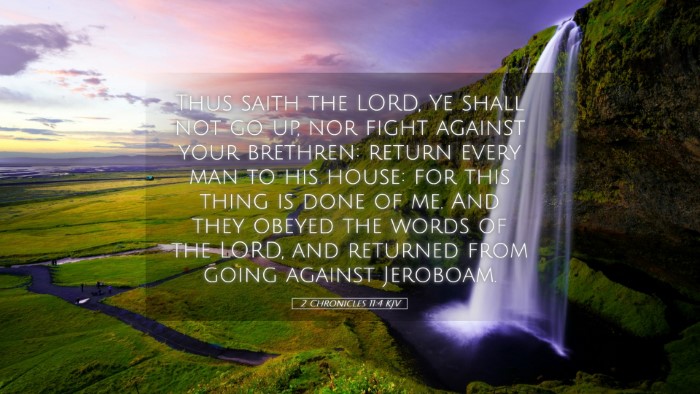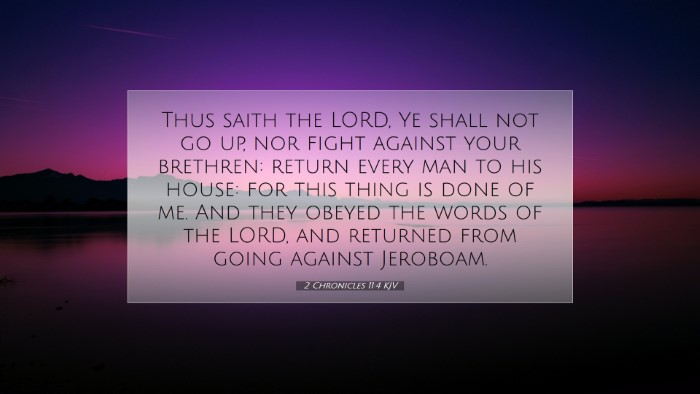Commentary on 2 Chronicles 11:4
Verse Context: "Thus saith the Lord, Ye shall not go up, nor fight against your brethren: return every man to his house; for this thing is done of me. And they obeyed the words of the Lord, and returned from going against Jeroboam."
Overview
This verse captures a pivotal moment in the history of Israel during the reign of Rehoboam. After the division of the kingdom, Rehoboam, the son of Solomon, faced a significant challenge as ten tribes revolted under Jeroboam’s leadership. In response to this insurrection, Rehoboam prepared to engage his own people in battle. Yet, the Lord intervened, sending a clear message that these divisions were part of His divine plan, urging Rehoboam to refrain from conflict.
Insights from Commentators
Matthew Henry's Commentary
Matthew Henry highlights the divine intervention in this tumultuous period. He emphasizes that the observed disunity among Israel's tribes was not an unforeseen circumstance but rather preordained by God. The directive given to Rehoboam reflects God’s sovereign control over the affairs of nations. Henry states, "This is the Lord's doing, and it is marvelous in our eyes." He argues that God sought to prevent further bloodshed and reaffirm the significance of unity among the people of Israel. Henry elaborates on the consequences of a civil war, noting that even if Rehoboam were successful in battle, the long-term implications would be detrimental to the nation’s spiritual integrity.
Albert Barnes' Notes on the Bible
Albert Barnes approaches this narrative with the understanding of the historical context of Israel’s monarchy. He notes that the conflict between Rehoboam and Jeroboam was due to heavy taxation and poor leadership in Solomon’s later years, which alienated the northern tribes. Barnes carefully interprets God’s message to Rehoboam as a reminder of divine authority in human affairs. He posits, "God had taken it upon Himself to intervene in the political matters of mankind, reminding leaders that their power is ultimately derived from Him." Moreover, he articulates that obedience to divine instruction was essential for Israel’s future. The prophesied division served as both judgment and grace, allowing Israel to avert a larger conflict.
Adam Clarke’s Commentary
Adam Clarke adds a layer of theological depth to this verse by discussing the notion of divine sovereignty and human agency. He asserts that the events leading to the tribal rebellion were not random but orchestrated according to God’s greater plan. Clarke states, "In a sovereign act, the Lord made it clear that He is not only involved in spiritual matters but actively governs the political landscape as well." Clarke also highlights the verse's moral implications: it showcases God’s desire for His people to seek peace and reconciliation rather than violence. He warns of the repercussions of defying God's guidance, advising that such defiance could lead to an even greater schism within the faith community.
Theological Reflections
In analyzing 2 Chronicles 11:4, a few theological themes emerge:
- Divine Sovereignty: The significance of God's will in human affairs cannot be understated. The passage illustrates that God has a purpose and plan that transcends human understanding. His prohibitions against civil strife remind leaders of their limitations.
- Obedience to God's Word: Rehoboam’s decision to heed God’s message serves as an important lesson about the nature of leadership and the necessity of aligning with divine wisdom. It emphasizes that leaders must submit to God’s will, which often directs them to paths of peace.
- Unity Among Believers: The call to avoid conflict among God's people poses challenges for contemporary church dynamics, especially in moments of disagreement or division. The passage urges a commitment to unity, reminding believers that infighting contradicts the call to love and serve one another.
Practical Applications for Leaders
This verse bears relevance for pastors, theologians, and church leaders today:
- Seek Divine Guidance: Just as Rehoboam received a message from the Lord, leaders today must actively seek God’s guidance through prayer and scripture when faced with decisions that can lead to division.
- Value Peace Over Power: The temptation to resort to force or exert authority in moments of conflict can be great. Leaders should prioritize reconciliation and strive for peaceful solutions.
- Encourage Unity: It is essential for leaders to cultivate unity within congregations, reminding members of their shared mission in Christ and the importance of working together for the kingdom’s purposes.
Conclusion
2 Chronicles 11:4 serves as a profound reminder of God's sovereignty, the necessity for obedience, and the call to unity amidst conflict. The insights drawn from the commentaries of Matthew Henry, Albert Barnes, and Adam Clarke enrich our understanding of this pivotal moment in Israel's history. As we reflect on this verse, may we be inspired to seek God’s will in all our dealings, striving to maintain peace and unity among believers, thereby fulfilling His purpose in our lives and our communities. Let it be an encouragement for both leaders and laity alike to trust in God’s divine plan as we navigate the complexities of faith and fellowship.


